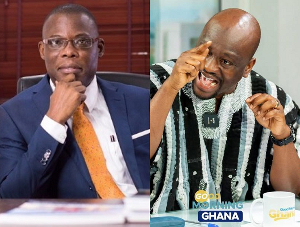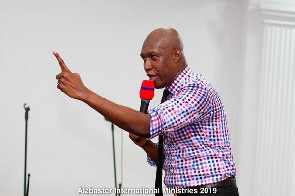Business News of Monday, 26 April 2004
Source: New African Magazine
Interview with Hon. Yaw Osafo-Maafo
INTERVIEW on March 2004 with Ghana's Finance Minister Osafo-Maafo: ''We are in control''
Question: Your government is now into its fourth year in office. Would you say the economy is better today than when you met it? If yes, what have you done right, and how does it reflect in the lives of the people?
Answer: I think the results are there for all to see. When we came to power, in the beginning of 2001, inflation stood at 40.1%, the bank lending rate was 55%; today inflation stands at 23.6% and the bank interest rates are hovering between 25% and 31%. That is a significant reduction. It is said that inflation is the enemy of the poor. Therefore, if you bring inflation down, you are increasing the value of the money in the pockets of the ordinary person – people sometimes forget about this. The best anybody can do to help any person is to keep the value of the money in his pocket constant, without reducing it. We have, therefore, worked at the macro level to bring inflation down, to bring interest rates down, to bring government borrowing down. What has happened is that the government was the single biggest borrower within the domestic financial set-up, and therefore the banks were completely crowded out. And once you crowd out the banks, you are crowding out the private sector. Last year, the government did not only set the target of zero borrowing from the domestic market, we also ended up paying back part of the domestic debt of about 0.4% of GDP, about 280 billion cedis. Therefore, I will say with some confidence that many things have gone right with the economy. All the indicators are pointing in the right direction and we are ready for a proper take-off in growth.
Question: Would you say the same about the national currency, the cedi. Only last September, the cedi stood at 15,500 to ?1. Today it is 16,700 to ?1. The cedi is still depreciating in value, and that is bad news.
Answer: Well, the cedi is still depreciating against the pound, against the dollar, against the euro, against all the other major currencies. But at what rate? In the year 2000, from January to December, the cedi lost its value from 3,200 to US $1 TO ABOUT 7,000 TO $1 – almost 100% devaluation. This was in the last year of the Rawlings government, before we came into office on 10th January 2001. Now, for the whole of 2003, against the pound, which is one of the strongest currencies in the world at the moment, the cedi depreciated about 18.5%. Against the US dollar, it was 4.6% - and we normally measure our devaluation against the dollar. Even against the euro, the cedi lost just about 17% last year. So on the whole, the cedi has done very well under our government. It is also important to find out the level of our foreign exchange reserves. Last year, we targeted 2.3 months of foreign exchange reserves of import cover. When we came into office in January 2001, we met only three weeks import cover. Today, we have almost four months of import cover.
Question: Is that enough?
Answer: It is more than enough! In fact, on the average we need three months import cover. Indeed, one of the primary criteria for the West African single currency convergence is that member countries must have at least three months import cover. We now have about four months import cover. We are doing very well.
Question: Last June, the Ghana Trades Union Congress (TUC) expressed concern about your government’s apparent wholesale adoption of World Bank conditionalities on trade. It said the World Bank’s interference in Ghana’s domestic affairs was inimical to the development agenda of the country. Do you agree?
Answer: Not only do I disagree, but it is also very clear that the TUC does not understand what it is talking about. About 85% of developing countries have development programmes with the IMF and the World Bank. Now, when you have programmes with the IMF and/or the World Bank (it is usually both), you discuss with them the management of your economy and the targets you want to attain. You do so in the context of prudent economic management. There is no country which believes that inflation or the rapid depreciation of the national currency is a good thing. If your room is dirty and somebody asks you to sweep it, it is not an insult. You should have done it yourself in the first place. At these meetings with the IMF/World Bank, we look at various economic parameters and we try to find out what would be the best means of bringing inflation and interest rates down, or allowing the private sector to have a hold on the economy. Some still believe that the government should be building factories. Our government does not believe in that. We believe that the government should be facilitating the building of factories by the private sector. Some believe that the government should be making state farms to generate employment. Our government does not believe in that. We believe that the government should make the business environment so friendly that the private sector will move into farming because it is profitable so to do. This is where some of us differ with the others. We discuss these matters with the IMF/World Bank. Of course, the IMF would always go in the direction of strengthening the private sector. And that also happens to be the basic policy of our government. Look at our manifesto. It is there! We made it clear to everybody, in our manifesto that ours was going to be government that would give the necessary support to the private sector for it to lead the growth of this country. And that also happens to be how the IMF thinks. Therefore, when we sit down with the IMF/World Bank, we go with our own programme and our own agenda. We compare notes, we don’t always agree, but we always come to a compromise.
Question: So how much of what is happening is your own governments discussed policy, and how much is directives form the IMF/World Bank? There is a perception that your government is being pushed too much here and there by the IMF/World Bank.
Answer: That is not true. People believe, for instance, that the government should subsidize petroleum products. That is how the TUC thinks! But I don’t believe in that. There is no country that can develop by taking taxes from nurses, teachers and from the TUC itself, and using them to subsidize those owning cars. Not all Ghanaians can afford to buy their own cars. What the government should therefore do, and we are doing, is to make sure that mass transportation is available for those who cannot afford to buy their own cars. We had a situation where we were spending about 60 billion cedis a month to subsidize petroleum products. Ghana is a total importer of crude oil. And it is not wise for us to use our scale foreign exchange earnings to import crude oil as we do, we spend US$450m a year to import crude oil, and then subsidize it for users. That cannot be done any more! The IMF does not support that, and we don’t support it either. So if we happen to agree with the IMF/World Bank on this matter, so be it!
Question: But you do know that in Ghana any increases in the prices of petroleum products have a serious negative impact on prices generally, leading to more inflation. You said as much in parliament only two days ago when reading the 2004 budget. The huge increase in fuel prices last year led to more difficulties which, as you said in parliament, forced you to bring in a supplementary budget to stem the tide. So, not subsidizing petroleum products has its own problems.
Answer: Yes, to some limited extent, and it should be so.
Question: But the enforced inflation or artificial economic difficulties arising from the fuel price increase last year affected the ordinary Ghanaians more than the man or woman who owns his/her own car because by virtue of the fact that they have more disposable income, they can still afford the increased prices come what my.
Answer: That is not true. That is not true! So, what we must do is that the ordinary person must be provided with public transport that is reliable and subsidized. That I am prepared to do. We are working towards subsidizing public transport, and at the moment we have buses in Accra that are subsidized. This year, we shall put on the roads 250 more buses from China which will be subsidized. We are also rehabilitating the railway system to enable commuters to travel more reliably and cheaply, say between Accra and Tema, and Accra and Nsawam. But we will support subsidizing petroleum products. We can select a petroleum product like kerosene and subsidize it because of the type of people who use it – mainly in the rural areas where the bulk of our people live. That’s what we are going to do. That’s what the IMF/World Bank think. That’s how our government also thinks.
Question: So you say the perception that the country is being run by the IMF/World Bank is not true, and that you arte not implementing wholesale directives from the IMF/World Bank.
Answer: It is absolutely false. Our political philosophy is based on the creation of an enabling environment for the private sector to lead economic growth. Politically, you can place us in the center of the spectrum; we are not a leftist government. An position and views as a centrist government happen to coincide on may occasions with the position and views of the IMF/World Bank. Therefore, if I go to the IMF myself, I go with a programme of not subsidizing petroleum products. That’s my position, and that’s also the position of the government. That’s what the IMF/World Bank also want. It is much more a meeting of minds. But, you see, you must also intervene to protect the poor. We have, this year, budgeted for about 80 billion cedis to subsidies water and electricity for those who consume at the lower end – i.e., the poor. Therefore, what we call “lifeline consumer” are going to be subsidized in the 2004 budget. And we have been subsidizing them. But we are not going to subsidies across the board for everybody. That is the difference. We will provide subsidy in appropriate cases, but it is never going to be wholesale.
Question: During the years when Ghana was known as a “start pupil” of the IMF/World, the Rawlings government resisted pressures to go HIPC (Highly Indebted Poor Country status). But you went HIPC as soon as your government was inaugurated. Why did you rush it?
Answer: To start with, it is not true that the Rawlings government resisted pressures to go HIPC. Indeed, you don’t just go HIPC if you are naot prepared to discipline the management of your economy. Nobody was even going to accept the Rawlings government to go HIPC. What does it mean by going HIPC? It means people should forgive you your debts, to write them off, to provide relief for the debts that you owe them. If you are not managing your economy properly, why should anybody give you relief for monies you have legitimately borrowed? People would do you that favour if they see your capability to manage the economy. And, therefore, you have to apply and be qualified for HIPC. There are two countries in West Africa, I won’t name them, which applied for HIPC and were turned own; they did not qualify. It is believed that they have enough resources not to go the way they are going, but they are not managing their economies properly and so nobody will accept them to go HIPC and get debt relief. First of all, we were, and still are, committed to changing the direction of the management of Ghana’s economy. And we decided to take advantage of HIPC because if there is a system that enables you to use payments that go out of your system in foreign exchange for the development of your country, I don’t see anything wrong with it. Last year, we benefited from HIPC resources to the tune of 750 billion cedis, and each district of the country, 110 in all, had over one billion cedis for development. This year, we are expecting about 950 billion cedis of HIPC relief, and we are carrying out all sorts of development programmes aimed at minimizing poverty and germinating growth. For example, we are using HIPC resources for reforestation; we have to restore our timber cover. We are using HIPC resources to build feeder roads to make it easier for our farmer’s to bring their producer to the marketing center. We are using HIPC resources to provide water in every village that doesn’t have potable water. We are using HIPC resources to do Phase 3 and 4 of our rural electrification programme. We are using HIPC resources to improve water in most secondary schools, especially those in Cape Coast that have serious water problems. We couldn’t have done all this without the HIPC resources. I think we took the right decision to go HIPC, and Ghanaians who did not initially believe that there were benefits to HIPC, now do! When we went HIPC, there was a general perception that, that was the beginning of the doom of Ghana; that we would never get credit form anywhere; our credit rating would go down forever. Today, it is interesting to note that Ghana invited Standard & Poors to do a credit rating, and the country, under our government, ended up with a B+. Therefore, the perception that HIPC was the beginning of Ghana’s doom was not only wrong but also misconceived.
Question: Last October when you spoke in London, you said “we went HIPC to obtain debt relief, and we are getting it”. Would you say you are getting it in the expected quantities?
Answer: Yes, very much so. In fact, last year we even got slightly more than we had programme for. And this year we expect to hit the target.
Question: So why has HIPC been a success here, but a failure elsewhere in Africa and beyond?
Answer: Well, you have the chance to access any funds, even as an individual, it is the application of the funds that will determine the final product. HIPC resources should not be used solely for the social sector as the World Bank and the IMF would want us to do. We, in Ghana, insisted that HIPC resources should partly be applied to sectors that would generate growth, which would generate employment that would provide support for the private sector. So, in this country we are even using HIPC resources to lend to macro-finance, to lend to small and medium-scale enterprises. We are learning from the mistakes of others. Other countries had used HIPC resources solely for the social sector, I don’t believe in that. Because, you see, if you are educating people and you keep educating them without providing jobs for them, you are going to create a bigger problem at the end of the day. That is why you should link the two. And we are doing just that. But the HIPC rules normally say that HICP relief should go only to the social sector, poverty-related reduction. But we went and argued that we should be allowed to use 20% of the HIPC resources to pay our domestic debt, so that interest rates would come down. If interest rates come down, who benefits? The private sector. HIPC resources should intervene in areas that create employment. Therefore, afforestation and all these things have been brought on board. So we have handled it differently.
Question: Last year when the President spoke at the People’s Assembly in Accra, he said something that went to the very heart of why Africa is not progressing. “It is a matter of great concern and indeed a shame for all Ghanaians, “he said, “that more than 60% of the country’s budget comes from development partners. “You are quoted elsewhere at 40%. So which is which – 60% or 40%?
Answer: It varies from year to year, but what is significant is that a very large proportion of our budget is donor-dependent and that is not good for self reliance. I think it is important for us to bring this factor home to people. So, the question one may ask is what have we done, as a government, to minimize this dependence on donor funds? In the year 2000, total tax revenue was 4.3 trillion cedis. The Rawlings government did not increase import duty or VAT. They remained the same. On the contrary, they removed what they called “special taxes of imports”. In 2001, when we came into office, we improved total tax revenue to 6.8 trillion cedis; and in 2002 to 8.5 trillion cedis. Last year, we improved it further to 13.4 trillion cedis. Therefore, as you can see, we have gone up about three times in revenue mobilization – from 4.3 trillion to 13.4 trillion – and that is only on tax revenue. We are now putting so much emphasis on non-tax revenue, and I think from all indications we will also make a big breakthrough there. So we are trying to improve the revenue base as a means of achieving national self-reliance.
Question: That is very new, but how do we get out completely from this dangerous situation of heavy dependence on donor support? Do you think we would ever get out of it?
Answer: But we are now reducing the dependence. From the data I have just given you, it is coming down. We will, however, never say no to any donor money that comes in. Grants, we will always say yes. But we should be increasing our own revenue mobilization, such that if one day, as you have just said, donor funding diminishes or does not come in, we can still make it. That’s how we are going about it. And, therefore, we must broaden the tax base of the country. We are not satisfied with the tax base. Many Ghanaians are not in the tax net. That is a challenge for this government.
Question: So what are you doing to broaden the tax base? In most of Africa, the tax base is too narrow. Only salaried workers end up paying tax. The other sectors. Kike market women who earn even more, pay no tax or very little.
Answer: We decided to put a lot of money into tax education, because it is important for people to know that if you want good roads and good sanitation, you need to pay taxes. We are also considering the possibility of giving tax amnesty to people, to create that environment in which we tell them: “Look, from today to the next six months you have tax amnesty. After that, anybody caught not paying tax would face the full rigors of the law. “We have not done it yet, but we are moving in that direction. We are also considering all manner of electronic systems for mobilizing tax revenue. Today when imports arrive at the ports, the bill of laden number goes into an electronic system called Gcnet, therefore it is almost impossible to dodge taxes at the ports. But people are finding innovative ways to under-value their imports, so we need a stronger database to reduce that level of tax evasion. We are in fact doing quite a lot to improve the tax system, but I admit that we still have a large sector of the population not in the tax net. Our even bigger challenge is what I call “the informal SME” [small and medium scale enterprises] operators, some of whom are very rich. We are trying to introduce new ways of getting them into the tax system.
Question: Going back to donor funding, in Britain they say “there is nothing like a free lunch”. What, therefore, are our development partners getting in return for funding 40% or 60% of our budget? Are they just being generous?
Answer: Well, I wouldn’t say that. There is a certain level of consciousness in these people to help Africa get our of certain levels of poverty. Some of the conditions they impose on us, in order to get the grants, are very interesting. For example, they say “you must improve the maternal mortality rate form 60% to 80%, you must provide free medical care for pregnant women, and you must improve girl-child education from 80% to 85%”. All of this tells a story, which is that there is a tinge of guilt for what they did to us in the past. They realize that they contributed to our level of poverty, and therefore they must provide certain inputs to improve that level of poverty. It is very clear from what they call ”triggers” which we are to meet as we discuss with them, that they want to help improve the quality of life for the poorer segment of our society. And then, don’t forget that if we become developed, we can also buy more from the West. If you begin by putting more people into wearing shoes, more people will buy shoes. So the question of markets is also part of their strategy. They are helping us to develop and at the same time helping to develop their own markets.
Question: But would they be happy if we develop our own shoe industry so that we don’t buy shoes from them?
Answer: Why not? That’s the way we should go. Our government has decided that we are going to process a minimum 40% of our cocoa production. Last year, we doubled the capacity of our Cocoa Processing Company. A third cocoa factory will soon be on stream. And Cargill, the biggest cocoa processor in the West, is knocking on our doors. They want to come in, because they see from the way we are going that we may end up processing the bulk of our cocoa here. So if they want Ghana’s premium cocoa, they had better get into partnership with us.
Question: But the more value added you put into your cocoa, the higher the taxes you pay exporting to the European Union, is that not true?
Answer: Yes, that is correct. You pay more duty on processed cocoa than on raw beans.
Question: In effect, they don’t want us to process our cocoa. They want us to continue exploring the raw beans.
Answer: Well, we must be competitive because they also have duties to impose. But what we are trying to do in the WTO discussions is to get the high EU tariffs removed, and it appears from all indications that the processing of certain primary products would be encouraged in the next round of the WTO talks.
Question: Some people say that foreign aid is a controlling mechanism used by the development partners against recipient countries such as Ghana. Do you agree?
Answer: Yes and no. As you said, there is nothing like a free lunch, but whoever is talking the lunch must know the price for taking that lunch. It thinks the problem that many African countries have is that they don’t prepare properly before going to the negotiating table. Some countries go to negotiate with the IMF/World Bank without their own lawyers. Some even go to negotiate on serious macro-economic parameters without a single person in their team understanding macro economics. But if you do that, as many countries do, you end up with a raw deal. I think we must prepare ourselves, do our home work well, know what is in for us and what we are going in for, and try to go with a formula that will, on net resultant basis, benefit us. And I think Ghana is doing that.
Question: Since you came into office, has there been any occasion where you felt the government was being pushed this way or that, buyt the development partners, using aid as leverage?
Answer: I have never heard any such thing. Neither the World Bank nor the IMF has ever asked any such thing of me or Ghana during our discussions.
Question: What about your bilateral donors, like Britain or the USA? Have they said: “if you don’t side with us on Iraq or Zimbabwe, you get a reduction in aid”, or something like that?
Answer: I co-ordinate bilateral and multilateral aid discussions of this country. And the Ministry of Finance in every country does the same thing. So far, there has been no occasion where we are told that we have to do something for or against another country in order to obtain funds. But I am not sure; I can’t say it with 100% confidence because in Ghana, the Ministry of Foreign Affairs also does some work at other levels, but at the Ministry of Finance we have never faced that kind of pressure from donors.
Question: Last year, when you met Ghanaians in London, you said you had set performance targets for the donors in much the same way as they set performance targets for us. Are they meeting their targets?
Answer: They are. For example, last year the donors were supposed to support our budget to the tune of US $281.5m. In the end, they gave us $286.5m – this was the first time ever in the history of this country where donor pledges marched with actuals. Therefore, the donors met their targets.
Question: How is privatization faring under your government? And why is the government doing away with state banks that are doing well, like the Ghana Commercial Bank (GCB), while at the same time trying to acquire VALCO (the aluminum smelter) that is not doing well?
Answer: Well, VALCo is still under discussion so I wouldn’t want to comment on it. But in the final analysis, even if the government acquires VALCO, it will certainly offload it to the private sector or bring on board a private operator. The government will not like to be seen operating VALCO. That is not how our government thinks. We are private sector oriented. We will bring in a private sector operator. But we are still discussing it so I wouldn’t want to pre-empt it by discussing it here with you.
Question: You said when reading the 2004 budget, that GCB shares will be floated on the Ghana Stock Exchange so that Ghanaians can buy parts of their national bank. But, from experience, privatized state assets end up in foreign hands. Why are we not encouraging our own people to buy these enterprises?
Answer: We always advertise them in both the local and foreign papers, and we look for strategic investors no matter where they come from. But today we don’t even have much to privatize because most of the state assets were privatized by the Rawlings government before we came into office. The last major privatization under our government is GCB.
Question: And much of this went, or is going, into foreign hands. So in the end our economy will be in foreign hands.
Answer: Look, 70% of the state assets was privatized by the Rawlings government before we came in. And to be fair to them, not all of them went into foreign hands, some were into Ghanaians hands.
Question: But wouldn’t it have been better for more to have gone into Ghanaian hands?
Answer: You privatize for what reasons? You privatize to introduce knowhow. You privatize to introduce the latest technology. Your privatize even to improve management. There are so many factors involved. Let’s take the Golden Tulip Hotel; it used to be run as Continental Hotel by the State Hotels Corporation. Today it is run by Golden Tulip, and what difference do you see? A big one! Last year, the total taxes paid by Golden Tulip to the government were about 10 billion cedis – far more than any dividend we have obtained from our assets. So you need good hotels, it went to foreign hands alright, and they are providing a good service. It is promoting tourism, it is helping the economy. You want to sell to a Ghanaians so that instead of getting 15 billion cedis in taxation, you end up with half a billion or even losses. That kind of selling to a Ghanaians for selling sake is wrong! You must sell an item so that the total productivity of that item will benefit the economy and the people of Ghana. That is how it should be.












